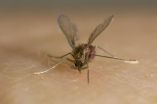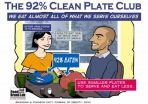(Press-News.org) The degree to which consumers perceive themselves to be knowledgeable about a product influences the likelihood that they will buy a particular product, researchers find in a series of studies published in Psychological Science, a journal of the Association for Psychological Science.
"Together, our findings suggest that subjective knowledge may play an important role in determining ideal size for choice sets," explains researcher Liat Hadar of the Arison School of Business at the Interdisciplinary Center Herzliya in Israel. "That is, more options should be provided in domains in which people often feel ignorant (e.g., wine), whereas fewer options should be offered in domains in which people tend to feel knowledgeable (e.g., soft drinks)."
Subjective knowledge — a person's belief about how much he or she knows — differs from actual knowledge, or expertise, yet previous research has shown that people are more inclined to let their subjective knowledge guide their behavior, including financial decision-making.
In a series of three studies, Hadar and colleague Sanjay Sood of the Anderson School of Management at the University of California, Los Angeles told several hundred adult participants that they would be choosing a product, such as coffee, wine, or a video game. The researchers manipulated their subjective knowledge by making participants think they were more or less knowledgeable than other participants in the study.
For example, in the first study, people who were told that other participants included coffee experts — a more knowledgeable group — reported lower subjective knowledge than participants who believed that they were being compared to teenagers —a less knowledgeable group.
Participants then had to choose a product from an array of either 5 or 25 options. They were told that they might be selected to win either the product they chose or $5, and that they had to choose which prize they would prefer if they won.
The data revealed that participants with high subjective knowledge were less likely to choose the product over the cash prize when they had many options, just as the researchers expected. Participants with low subjective knowledge, on the other hand, were more likely to choose the product when presented with a wide array of choices.
According to Hadar and Sood, these outcomes are likely due to the fact that knowledgeable consumers are prone to "choice overload" — feeling so overwhelmed that you end up unhappy with a decision or even fail to make a decision — whereas less knowledgeable consumers feel that a wide array of options gives them helpful information about the product.
One of the studies, however, revealed an important caveat to these findings: Consumers with low subjective knowledge are more likely to purchase products from large selections only when the product information is easily understandable.
So, for example, participants with low subjective knowledge preferred having more options when they were asked to choose a bottle of wine but only when the options included helpful information such as notes about the flavor or grape varietal for each wine. They did not prefer having more options when the information provided was less useful, such as the name of the winery.
Previous research suggests that this phenomenon manifests itself in everyday life in important domains such as financial planning:
"Research shows that most employees feel ignorant about 401(k) retirement saving plans, even when they are exposed to relevant information, because they find such information too complex," explains Hadar. "Our model suggests, and others' empirical data show, that employees are indeed reluctant to join 401(k) as more options become available."
Hadar and Sood believe that the findings of these three studies may offer insight to policy makers tasked with deciding the optimal number of choices to offer consumers in everything from investment and retirement options to health plans.
INFORMATION:
This research was supported in part by Marie Curie International Reintegration Grant PIRG06-GA-2009-252592 (to L. Hadar).
For more information about this study, please contact: Liat Hadar at lhadar@idc.ac.il.
The article abstract is available online: http://pss.sagepub.com/content/early/2014/07/18/0956797614539165.abstract
The APS journal Psychological Science is the highest ranked empirical journal in psychology. For a copy of the article "When Knowledge Is Demotivating: Subjective Knowledge and Choice Overload" and access to other Psychological Science research findings, please contact Anna Mikulak at 202-293-9300 or amikulak@psychologicalscience.org.
Knowledgeable consumers more likely to buy when given fewer options
2014-07-23
ELSE PRESS RELEASES FROM THIS DATE:
Benefits of combo lipid emulsion no greater than soy-based emulsion for pediatric patients
2014-07-23
Lipid emulsions are crucial for providing essential fatty acids and energy to infants and children who need intravenous feeding. There has been concern that soybean-based emulsions could compromise immune functions and promote liver damage due to its composition. Combination lipid emulsions based on triglyceride oil, fish oil, or olive oil have been developed to address this concern.
However, researchers at Rutgers and Tufts universities found that concern may be unwarranted, according to a review published today in the OnlineFirst version of the Journal of Parenteral ...
Largest genetic survey to date shows major success of giant panda breeding programs
2014-07-23
Heroic worldwide conservation efforts have made great strides in saving China's endangered national treasure, the giant panda. Now, in China, there are over 65 giant panda reserves that have been established and three large breeding centers. But despite these efforts, just 1596 pandas remain in the wild.
Breeding programs in conservation centers and zoos hope to save the panda by improving genetic diversity, avoid inbreeding and ultimately, introduce pandas back to the wild. Just how are these high-profile programs doing so far?
In a new study appearing in the advanced ...
The human parasite Leishmania is a probiotic for the fly that carries it
2014-07-23
The Leishmania parasite, which causes the human disease leishmaniasis, acts as a probiotic in the insect that transmits it to humans, protecting them from bacterial disease. Findings published in the open access journal Parasites and Vectors suggest that using bacterial controls to stop the spread of leishmaniasis could sometimes have the opposite effect to that intended, by benefiting flies carrying the parasite.
Around 12 million people are currently infected with leishmaniasis worldwide, mostly in South America, Africa and Asia. It is estimated to kill 20-50,000 people ...
Stress can make hard-working mongooses less likely to help in the future
2014-07-23
Researchers studying banded mongooses in Uganda have discovered that those who work hard to care for pups may be less likely to invest in future offspring in the same way due to elevated stress hormones.
Dr Jennifer Sanderson, from the University of Exeter, has been observing wild banded mongooses to understand why working hard makes them less likely to work hard in the future.
She discovered that when a banded mongoose invests heavily to care for mongoose pups, it experiences an increase in circulating stress hormones (or 'glucocorticoids'), and these high stress ...
New model helps explain how provisions promote or reduce wildlife disease
2014-07-23
Athens, Ga. – Scientists have long known that providing supplemental food for wildlife, or resource provisioning, can sometimes cause more harm than good. University of Georgia ecologists have developed a new mathematical model to tease apart the processes that help explain why. Their research, which has implications for public health and wildlife conservation, appears in the Royal Society journal Biology Letters.
Wildlife of many kinds are increasingly finding their meals in human environments, gathering at places like backyard bird feeders, landfills or farms that offer ...
In asthma, it's not just what you smell, but what you think you smell
2014-07-22
PHILADELPHIA (July 22, 2014) – New research from the Monell Center reveals that simply believing that an odor is potentially harmful can increase airway inflammation in asthmatics for at least 24 hours following exposure. The findings highlight the role that expectations can play in health-related outcomes.
"Asthmatics often are anxious about scents and fragrances. When we expect that an odor is harmful, our bodies react as if that odor is indeed harmful," said study lead author Cristina Jaén, PhD, a Monell physiologist. "Both patients and care providers need to understand ...
The dopamine transporter
2014-07-22
Recent published research in the Journal of Clinical Investigation demonstrates how changes in dopamine signaling and dopamine transporter function are linked to neurological and psychiatric diseases, including early-onset Parkinsonism and attention deficit hyperactivity disorder (ADHD).
"The present findings should provide a critical basis for further exploration of how dopamine dysfunction and altered dopamine transporter function contribute to brain disorders" said Michelle Sahai, a postdoctoral associate at the Weill Cornell Medical College of Cornell University, ...
Alaska frogs reach record lows in extreme temperature survival
2014-07-22
Freezing and thawing might not be good for the average steak, but it seems to help wood frogs each fall as they prepare to survive Alaska's winter cold.
"Alaska wood frogs spend more time freezing and thawing outside than a steak does in your freezer and the frog comes back to life in the spring in better shape than the steak," said Don Larson, University of Alaska Fairbanks graduate student and lead author on a recent paper demonstrating that freeze tolerance in Alaska wood frogs is more extreme than previously thought.
Although wood frogs are well-studied freeze-tolerant ...
Study examines presence of uterine cancers at the time of hysterectomy using morcellation
2014-07-22
Among women undergoing a minimally invasive hysterectomy using electric power morcellation, uterine cancers were present in 27 per 10,000 women at the time of the procedure, according to a study published by JAMA. There has been concern that this procedure, in which the uterus is fragmented into smaller pieces, may result in the spread of undetected malignancies.
Despite the commercial availability of electric power morcellators for 2 decades, accurate estimates of the prevalence of malignancy at the time of electric power morcellation (in this study referred to as morcellation) ...
The 92 percent clean plate club
2014-07-22
If you're a member of the Clean Plate Club – you eat pretty much everything you put on your plate – you're not alone! A new Cornell University study shows that the average adult eats 92% of whatever he or she puts on his or her plate. "If you put it on your plate, it's going into your stomach," says Brian Wansink Ph.D., author of the forthcoming book, Slim by Design, Professor of Marketing and Director of the Cornell Food and Brand Lab.
Wansink and co-author Katherine Abowd Johnson analyzed 1179 diners and concluded that we're a Clean Plate Planet. Although diners ...




